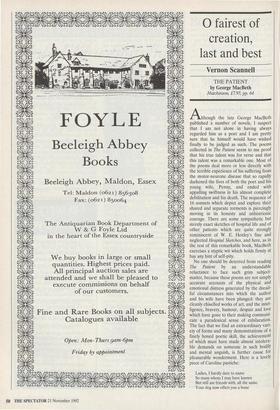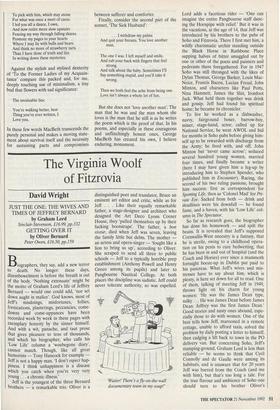o fairest of creation, last and best
Vernon Scannell
THE PATIENT by George MacBeth Hutchinson, £7.95, pp. 64 Athough the late George MacBeth published a number of novels, I suspect that I am not alone in having always regarded him as a poet and I am pretty sure that he himself would have wished finally to be judged as such. The poems collected in The Patient seem to me proof that his true talent was for verse and that this talent was a remarkable one. Most of the poems deal more or less directly with the terrible experience of his suffering from the motor-neurone disease that so rapidly darkened the lives of both the poet and his young wife, Penny, and ended with appalling swiftness in his almost complete debilitation and his death. The sequence of 16 sonnets which depict and explore their shared and separate torments is piercingly moving in its honesty and unhistrionic courage. There are some sympathetic but sternly exact sketches of hospital life and of other patients which are quite strongly reminiscent of W. E. Henley's fine and neglected Hospital Sketches, and here, as in the rest of this remarkable book, MacBeth exercises a styptic wit which holds firmly at bay any hint of self-pity.
No one should be deterred from reading The Patient by an understandable reluctance to face such grim subject- matter, because these poems are not simply accurate accounts of the physical and emotional distress generated by the dread- ful circumstances into which the author and his wife have been plunged: they are cleanly chiselled works of art, and the intel- ligence, bravery, humour, despair and love which have gone to their making communi- cate a paradoxical sense of exhilaration. The fact that we find an extraordinary vari- ety of forms and many demonstrations of a finely honed poetic skill, the achievement of which must have made almost intolera- ble demands on someone in such bodily and mental anguish, is further cause for pleasurable wonderment. Here is a lovely piece of Caroline pastiche:
Ladies, I hardly dare to name So many whom I may have known But still am friends with, all the same. Your dog now offers you a bone To pick with him, which may atone For what was once a mort of cares. I led you all a dance, I own, And now retire more slow upstairs Fencing my way through falling shares. Promote my pages to your hearts Where I may lie with bulls and bears And think no more of strawberry tarts Than I have done of truth and lies In writing down these mysteries.
Against the stylish and stylised dexterity of 'To the Former Ladies of my Acquain- tance' compare this packed and, for me, deeply touching use of minimalism, a tiny bud that flowers with sad significance:
The invaluable lies: You're walking better, best Thing you've ever written, I Love you.
In these few words MacBeth transcends the purely personal and makes a moving state- ment about survival itself and the necessity for sustaining pacts and compromises between sufferer and comforter.
Finally, consider the second part of the sonnet, The Sick Husband':
... I withdraw my palms And quit your breasts. You love another man, The one I was. I left myself and smile, And rub your back with fingers that feel strong
And talk about the baby. Sometimes I'll Say something stupid, and you'll take it wrong.
Then we both feel the ache from being one. Love isn't always a whole lot of fun.
But she does not 'love another man'. The man that he was and the man whom she loves is the man that he still is as he writes the poem which is the proof of that. In his poems, and especially in these courageous and unflinchingly honest ones, George MacBeth has created his own, I believe enduring, monument.











































































 Previous page
Previous page